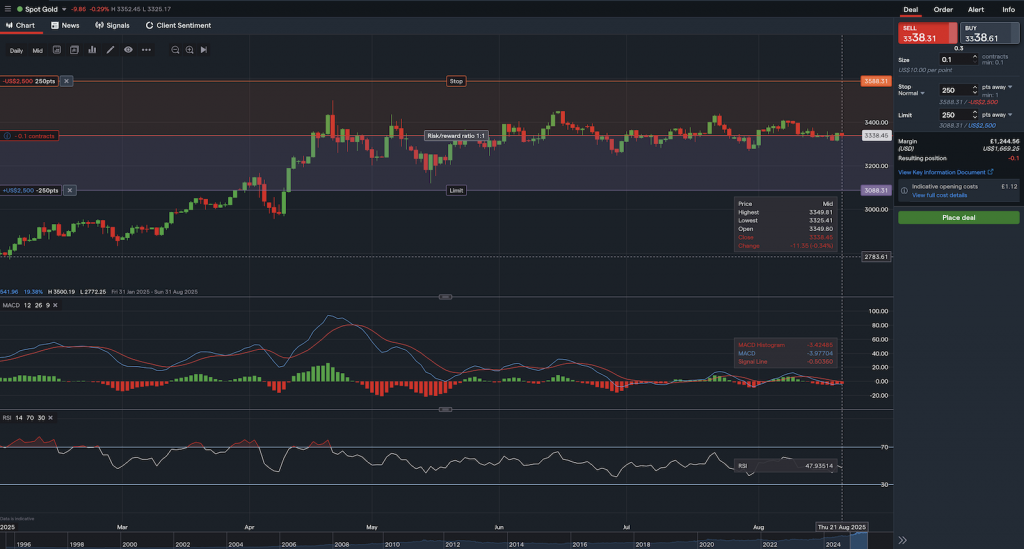Best Commodity Brokers For Swing Trading 2025



Swing trading commodities is all about spotting short- to medium-term price movements and acting decisively. And I know from firsthand experience that the broker you use to do that through is vital.
We highlight the best commodity brokers for swing trading that give you the edge you need to navigate energy, metals, and agricultural markets with confidence.
How SwingTrading.com Chose The Top Brokers For Commodities
We identified the best brokers for commodities by analysing their range of markets (from gold and oil to softs and energies), spreads and fees, and contract types offered, then testing platforms directly to assess execution quality and trading experience.
By combining these quantitative checks with hands-on insights, we highlighted brokers that make commodity trading both accessible and cost-effective.
How To Choose A Commodity Broker For Swing Trading
- Market access & instruments: The commodities a broker offers shape your trading opportunities and diversification. Access to metals, energy, and agricultural markets lets you act on global cycles, while understanding instruments—futures, CFDs, or physical contracts—helps manage leverage, costs, and risk.
- Fees & costs: Trading costs directly impact profitability, particularly for leveraged, short-term trades. Brokers may charge commissions or embed costs in spreads, which can widen during volatility. Overnight positions may incur swap or rollover fees, and deposit, withdrawal, or inactivity charges can quietly erode gains. Awareness of these costs allows you to manage net returns efficiently.
- Platform & tools: A broker’s platform dictates how effectively you can analyze and act on market movements. Platforms like MT4, MT5, and cTrader provide advanced charting, custom indicators, and automated trading tools—essential for timing swing entries and exits. Mobile apps and integrated fundamental data enable you to monitor and react to volatile commodity markets from anywhere.
- Leverage & risk management: Leverage magnifies both gains and risks. Understanding margin requirements is critical, as falling below them can trigger margin calls or forced liquidations. Risk management tools like stop-loss orders and negative balance protection help limit losses in fast-moving commodity markets.
- Order execution: Fast, reliable execution is vital for swing trading. Market execution fills orders at current prices, while instant execution locks in a quote before confirmation. Brokers offering multiple order types—market, limit, stop, and trailing stop—give you the flexibility to enter, exit, and manage positions strategically.
- Account types & base currency: Account features affect leverage, fees, and trading scope. Choosing an account in your preferred currency can reduce conversion costs and simplify cost management.
- Support & education: Strong customer support and educational resources are invaluable. Multi-channel assistance ensures timely help, while webinars, tutorials, and market analysis empower you to refine strategies and make informed decisions.
- Regulation & safety: Regulated brokers provide transparency, segregated client funds, and capital adequacy safeguards. Many jurisdictions also offer investor protection schemes, giving you added security while navigating high-risk commodity markets.
With commodities, where overnight fees and execution speed can make or break a trade, the right broker feels less like a platform and more like a risk management tool.After switching to a broker with tighter spreads and more reliable fills, I noticed that my setups started paying closer to what I’d planned on the chart.
What Is Commodity Swing Trading?
Commodity swing trading involves targeting short- to medium-term price movements in markets such as oil, gold, or agricultural products, typically over several days to a few weeks.
Traders rely on technical analysis tools—like Fibonacci retracements, moving average crossovers, and momentum oscillators—to identify high-probability entry and exit points.
Beyond charts, successful swing traders factor in supply-demand imbalances, seasonal trends, and macroeconomic indicators such as inventory reports or currency shifts, allowing them to anticipate swings rather than react to them.
Risk management—position sizing, stop-loss placement, and volatility-adjusted targets—is critical to protect capital while exploiting these fleeting opportunities.

Swing trading gold at IG with MACD, RSI, and defined risk/reward levels
Pros Of Commodity Swing Trading
- Exploit short-term volatility: Commodity prices fluctuate in response to seasonal cycles, supply shocks, and shifts in demand. You can capture these moves using technical setups like trendline breaks, moving average crossovers, or Bollinger Band signals.
- Flexible leverage & risk control: Margin trading allows you to scale positions with disciplined stop-losses and volatility-adjusted sizing, maximizing returns while managing risk.
- Combine technical & fundamental edge: Swing trading lets you time trades with charts while factoring in inventory reports, weather, and geopolitical events, giving a practical edge over purely long-term strategies.
Cons Of Commodity Swing Trading
- Market volatility can backfire: While swings create opportunities, sudden commodity shocks—like geopolitical crises or unexpected weather events—can trigger rapid losses if stops aren’t tight.
- Requires constant monitoring: Swing trading demands regular chart checks, news tracking, and adjusting positions, which can be time-intensive compared to longer-term strategies.
- Higher transaction costs: Frequent entries and exits can accumulate fees and spreads, eating into profits, especially in less liquid commodity markets.
The biggest lesson I’ve learned in swing trading commodities is that timing isn’t just about the chart—it’s about understanding the rhythm of the market itself. Oil reacts to headlines, gold to sentiment, and crops to seasons. Aligning setups with those cycles makes trades feel calculated, not random.
Bottom Line
Choosing the right broker is crucial for commodity swing trading, as execution speed, market access, and reliable tools directly affect profitability.
The best commodity brokers for swing trading offer competitive fees, advanced charting and order management, responsive support, and access to multiple commodity markets.
With the right platform, you can efficiently capitalize on short- to medium-term price swings while managing risk with precision.
